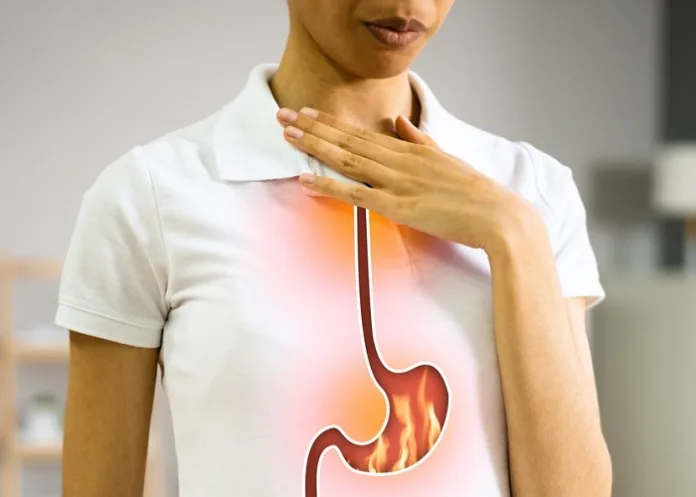Reflux disease, which manifests as acid regurgitation and heartburn, has been known as a risk factor for oesophageal cancer, but a recent study now suggests that the majority of these patients do not, in fact, have a higher risk of cancer.
The large-scale study by researchers at Karolinska Institutet from three Nordic countries found that the cancer risk was elevated only in patients whom gastroscopy revealed to have changes in the oesophageal mucosa.
“This is a gratifying result as reflux disease is a very common condition and most patients are found to have a completely normal mucus membrane on gastroscopic examination,” said the study’s first author, Dr Dag Holmberg, researcher at the Department of Molecular Medicine and Surgery, Karolinska Institutet and resident doctor of surgery at Karolinska University Hospital in Sweden.
In reflux disease, acidic stomach contents leak into the oesophagus. This can sometimes cause inflammation in the oesophageal mucus membrane (oesophagitis), which is diagnosed via gastroscopy.
It is common knowledge that reflux disease increases the risk of oesophageal cancer, but what the cancer risk is for patients with normal mucosa has remained unknown.
The symptoms of reflux disease can come and go but generally persist, which means that many patients frequently seek medical attention and often undergo repeated gastroscopies to detect mucosal lesions or prodromal cancer.
“Our study suggests that these repeated gastroscopies are probably unnecessary for people with reflux disease who have a normal oesophageal mucosa,” said Holmberg. “These findings should be reassuring for this large patient group, and can guide GPs who often treat them.”
The research, published in The BMJ, was based on national health data registries in Sweden, Denmark and Finland, and included more than 285 000 individuals with reflux disease and no gastroscopic evidence of oesophagitis. The patients were followed for up to 31 years and the researchers registered all cases of oesophageal cancer.
The cancer risk was then compared with that for individuals from the general population matched by age and sex and at the same period, in the three countries. No increased risk of oesophageal cancer was observed in patients with reflux disease and a normal mucus membrane.
By way of comparison, the researchers also analysed the cancer risk in more than 200 000 individuals with reflux disease and oesophagitis. These people were at a clearly increased relative risk of developing oesophageal cancer.
“We now intend to examine what factors other than oesophagitis can be linked to tumour growth in people with reflux disease,” said the study’s last author, Jesper Lagergren, professor of surgery at the Department of Molecular Medicine and Surgery, Karolinska Institutet, and consultant surgeon at Karolinska University Hospital.
The study was a collaboration between researchers at Karolinska Institutet and Karolinska University Hospital in Sweden, the University of Copenhagen in Denmark, and the universities of Helsinki and Oulu in Finland.
Study details
Non-erosive gastro-oesophageal reflux disease and incidence of oesophageal adenocarcinoma in three Nordic countries: population based cohort study
Dag Holmberg, Giola Santoni, My von Euler-Chelpin, Martti Färkkilä, Joonas H Kauppila, John Maret-Ouda, Eivind Ness-Jensen, Jesper Lagergren.
Published in The BMJ on 13 September 2023
Abstract
Objective
To assess the incidence rate of oesophageal adenocarcinoma among patients with non-erosive gastro-oesophageal reflux disease compared with the general population.
Design
Population based cohort study.
Setting
All patients in hospital and specialised outpatient healthcare in Denmark, Finland, and Sweden from 1 January 1987 to 31 December 2019.
Participants
A total of 486 556 adults (>18 years) who underwent endoscopy were eligible for inclusion: 285 811 patients were included in the non-erosive gastro-oesophageal reflux disease cohort and 200 745 patients in the validation cohort with erosive gastro-oesophageal reflux disease.
Exposures
Non-erosive gastro-oesophageal reflux disease was defined by an absence of oesophagitis and any other oesophageal diagnosis at endoscopy. Erosive gastro-oesophageal reflux disease was examined for comparison reasons and was defined by the presence of oesophagitis at endoscopy.
Main outcome measures
The incidence rate of oesophageal adenocarcinoma was assessed for up to 31 years of follow-up. Standardised incidence ratios with 95% confidence intervals were calculated by dividing the observed number of oesophageal adenocarcinomas in each of the gastro-oesophageal reflux disease cohorts by the expected number, derived from the general populations in Denmark, Finland, and Sweden of the corresponding age, sex, and calendar period.
Results
Among 285 811 patients with non-erosive gastro-oesophageal reflux disease, 228 developed oesophageal adenocarcinomas during 2 081 051 person-years of follow-up. The incidence rate of oesophageal adenocarcinoma in patients with non-erosive gastro-oesophageal reflux disease was 11.0/100 000 person-years. The incidence was similar to that of the general population (standardised incidence ratio 1.04 (95% confidence interval 0.91 to 1.18)), and did not increase with longer follow-up (1.07 (0.65 to 1.65) for 15-31 years of follow-up). For validity reasons, we also analysed people with erosive oesophagitis at endoscopy (200 745 patients, 1 750 249 person-years, and 542 oesophageal adenocarcinomas, corresponding to an incidence rate of 31.0/100 000 person-years) showing an increased overall standardised incidence ratio of oesophageal adenocarcinoma (2.36 (2.17 to 2.57)), which became more pronounced with longer follow-up.
Conclusions
Patients with non-erosive gastro-oesophageal reflux disease seem to have a similar incidence of oesophageal adenocarcinoma as the general population. This finding suggests that endoscopically confirmed non-erosive gastro-oesophageal reflux disease does not require additional endoscopic monitoring for oesophageal adenocarcinoma.
See more from MedicalBrief archives:
Reflux medication-use linked to dementia – US analysis
Aspirin with acid reducers helps acid reflux patients slow cancer advance
Aspirin linked to reduction in risk of several cancers of the digestive tract

